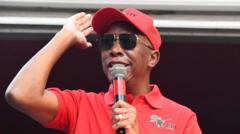In a detailed statement from the Home Office, officials described Malema as "non-conducive to the public good," citing his inflammatory remarks and extremist stance. Notably, Malema threatened to arm Hamas and has called for violent actions against white citizens, drawing condemnation from various quarters. His party, while expressing outrage, claims the ban is an act of cowardice that inhibits necessary political dialogue.
Interestingly, Malema gained international attention when he was featured in a video during a meeting between South African President Cyril Ramaphosa and former US President Donald Trump. However, the latest denial comes with no right to appeal and suggests that future applications are likely to be rejected, as confirmed by local media.
As reactions unfold, this incident raises questions on the balance between ensuring public safety and upholding the principles of free speech and political engagement. Critics of the UK government's decision argue it undermines political debate, while supporters contend that it is a necessary measure to prevent potential unrest associated with inflammatory political figures.
Interestingly, Malema gained international attention when he was featured in a video during a meeting between South African President Cyril Ramaphosa and former US President Donald Trump. However, the latest denial comes with no right to appeal and suggests that future applications are likely to be rejected, as confirmed by local media.
As reactions unfold, this incident raises questions on the balance between ensuring public safety and upholding the principles of free speech and political engagement. Critics of the UK government's decision argue it undermines political debate, while supporters contend that it is a necessary measure to prevent potential unrest associated with inflammatory political figures.

















